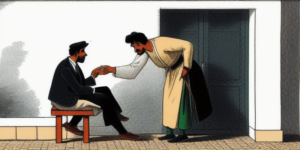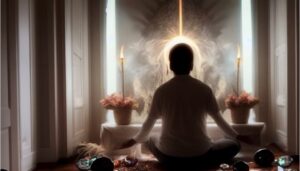It is not true that most enlightened masters are men. There are as many enlightened women as men. We just don’t hear about them often.
You see, when a woman reaches enlightenment, she might not necessarily proclaim it to the world. Instead, she might choose to bask in the tranquility and serenity of her newfound state. She could be sitting right next to you, filled with the wisdom of the ages, and you might not even be aware of it. I mean, how could we possibly know unless another enlightened being was to recognize that aura in her, right?
It’s almost like there’s a divine law at play, creating a unique dynamic between the minds of women and men. Now, I don’t want to generalize – we’re all complex beings with our own individual traits – but, as a rule of thumb, it seems that men are more often intellectually dominant, while women are emotionally dominant. Now, it’s essential to clarify that this doesn’t imply that women lack intellectual capacities or that men are devoid of emotional depth. The key term here is ‘dominant,’ a word suggesting the natural disposition more often observed in one gender over the other, it’s just about what tends to be more prominent.
This polarity is nature’s way of establishing balance. We complement each other in so many ways, after all. Think about it: by nature, men and women are designed to complement each other, a delicate balance of yin and yang, if you will. This balance plays out in numerous ways, one of which might be the expression of enlightenment.
When a man attains enlightenment, his intellectual dominance drives him to share his experiences, to teach, to guide, and to become a master in the public eye. His enlightenment becomes an intellectual discourse that others can learn from. Men may find it easier to articulate their experiences of enlightenment, to become ‘masters’ who share their insights with the world. Their language, fueled by analytical thought, allows them to present their experience in a manner palatable to the masses. They’re naturally inclined to journey outward, sharing their enlightenment with the world.
And what about women? Well, when they’re enlightened, their emotional dominance might mean they prefer to keep their experience to themselves. Instead of expressing it to the world, they savor the silence and the peace that comes with their enlightenment. It’s a quieter, more introspective journey.
Given their emotional dominance, they relate differently to their enlightenment. Perhaps their journey turns inward, into the quiet space of introspection and personal growth. Their enlightenment might not be shouted from the rooftops but rather whispered in the solitude of their hearts. This doesn’t make their experience any less valid, simply less visible to the untrained eye.
So, do we see more male ‘enlightened masters’ because they’re more likely to step into the public sphere, while enlightened women prefer a quieter, more personal engagement with their enlightenment? Are we overlooking the silent multitude of enlightened women simply because their expressions differ from societal expectations? These are questions worth pondering.
While we may never have definitive answers, the exploration itself is illuminating. It challenges us to reconsider our assumptions and to appreciate the diversity of the human experience, even in something as profound as enlightenment.
It’s worthwhile to question whether our societal norms and structures play a role in shaping the public face of enlightenment. Does the world we’ve constructed inadvertently favor the visibility of enlightened men over women?
Consider this: Historically, societies across the globe have been predominantly patriarchal, placing men in positions of authority and power. Is it possible that this societal bias influences who we see as ‘enlightened masters’? If so, this wouldn’t necessarily mean that there are more enlightened men than women, but rather that men are more often seen, heard, and recognized in this capacity.
And what about our very understanding of ‘enlightenment’ and ‘mastery’? Are these concepts themselves influenced by gendered expectations and biases? It’s important to critically consider these notions. Are we associating enlightenment with certain behaviors or expressions that align more closely with men’s dominant intellectual nature? Could we be overlooking the different yet equally profound manifestations of enlightenment that may be more aligned with women’s dominant emotional nature?
It might be worthwhile to pose these questions: What would it look like if we expanded our understanding of enlightenment to encompass a broader range of experiences and expressions? What if we acknowledged that the silent, inward journey of an enlightened woman is just as meaningful and profound as the public teachings of an enlightened man?
Let’s consider the journey to enlightenment itself. If we accept that men and women are endowed with different dominant traits – intellectual for men and emotional for women – does this mean that their paths to enlightenment are different? And if so, how does this difference shape their experiences and expressions of enlightenment?
Men, with their intellectual dominance, approach enlightenment through an analytical, knowledge-based path. And in contrast, women, with their emotional dominance, experience enlightenment through a more intuitive, feeling-based path. It’s only natural that their expressions of enlightenment would also differ.
If we dive deeper into this, we might start to see that the question isn’t simply ‘why are most enlightened masters men?’ but rather ‘why do we perceive most enlightened masters to be men?’ And even more importantly, ‘how can we broaden our understanding and recognition of enlightenment to honor and include the myriad ways it manifests across genders?’
As we ponder these ideas, we begin to see the value in challenging our assumptions and expanding our perspectives. The exploration of enlightenment – both in ourselves and others – becomes a richer, more nuanced journey when we acknowledge and appreciate the diversity of human experiences and expressions. It’s a journey that’s not confined to one gender or another but is a universal human quest, as varied and beautiful as humanity itself.





